How to Provide the Best Diet for Your Russian Blue
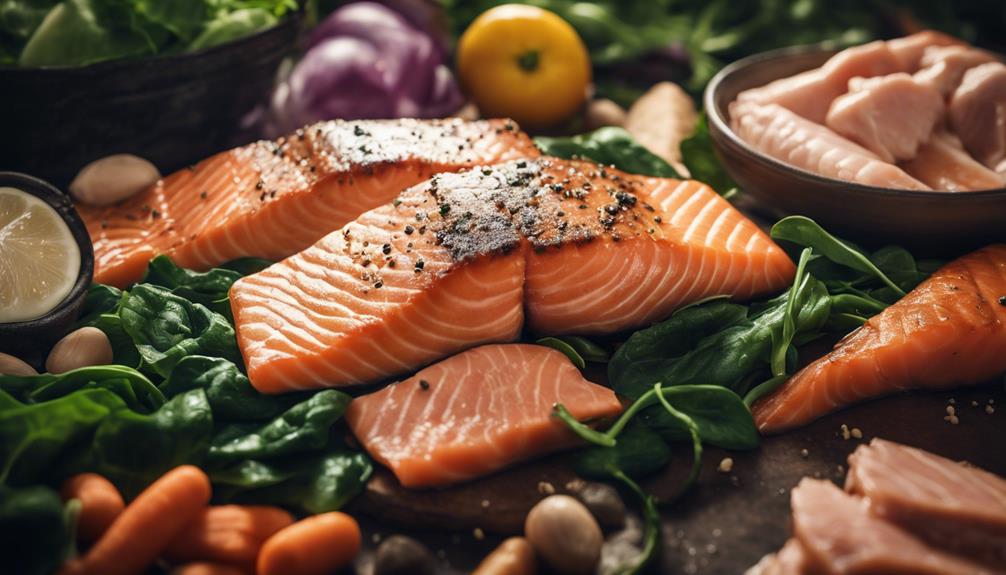
Russian Blue cats are known for their sleek, elegant appearance and gentle temperament. When it comes to their diet, it is essential to provide them with a well-balanced and nutritious diet to maintain their overall health and well-being.
One of the most important aspects of a Russian Blue cat's diet is ensuring that they receive adequate protein. Protein is essential for muscle growth and maintenance, and it is particularly important for active and playful breeds like the Russian Blue.
In addition to protein, Russian Blue cats also require a diet that is rich in essential fatty acids, such as omega-3 and omega-6 fatty acids. These fatty acids play a crucial role in maintaining healthy skin and coat, as well as supporting overall immune function.
When choosing a diet for your Russian Blue cat, it is important to opt for high-quality cat food that is specifically formulated to meet their unique nutritional needs. Look for a diet that is rich in protein, contains essential fatty acids, and is free from artificial additives and fillers. It is also essential to provide your Russian Blue cat with access to fresh, clean water at all times to support their hydration and overall health.
Understanding Russian Blue Nutritional Needs
When considering the dietary requirements of Russian Blue cats, it's crucial to prioritize high-quality protein levels to support muscle mass and tissue repair. Russian Blue cats require protein levels between 30-45% in their diet to maintain their lean muscle mass and aid in tissue repair.
Additionally, healthy fats such as omega-3 and omega-6 play a vital role in providing energy and maintaining a glossy coat for these feline companions. Carbohydrates aren't essential for Russian Blue cats, but incorporating fiber can promote healthy digestion.
In terms of essential nutrients, vitamins like A, E, D, and minerals such as calcium are crucial for the overall health and well-being of Russian Blue cats. When selecting food for these felines, it's imperative to focus on quality ingredients that provide the necessary nutrients without unnecessary fillers or artificial additives.
Types of Food for Russian Blue Cats
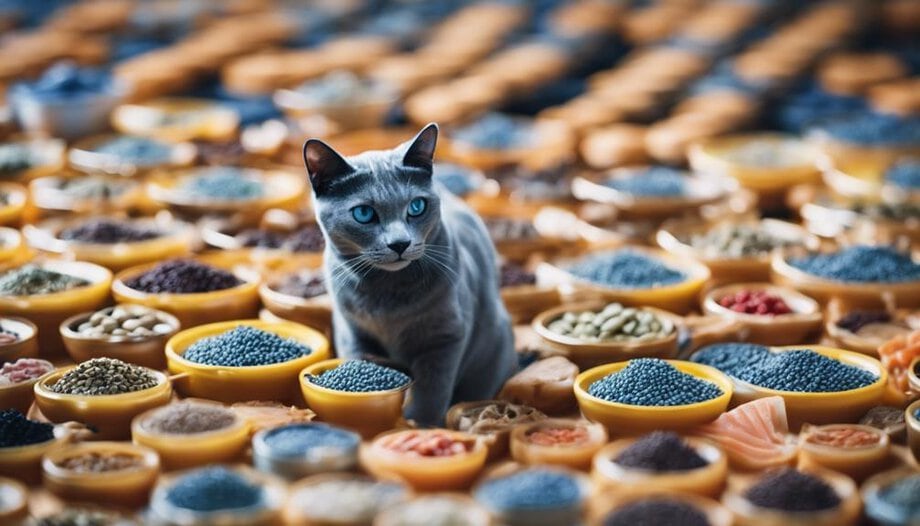
Russian Blue cats benefit from a protein-rich diet to support their lean muscle mass and overall health. Ensuring proper hydration through wet food is essential as it can prevent urinary tract issues common in this breed.
Owners should also consider premium cat food brands known for their quality ingredients when selecting the best diet for their Russian Blue.
Protein-Rich Diet Options
One of the key components in ensuring optimal health for your Russian Blue cat is providing a protein-rich diet. This diet can consist of premium dry kibble, wet canned food, raw food, homemade meals, or high-quality commercial cat foods. Protein is crucial for muscle mass development, tissue repair, and maintaining energy levels in Russian Blue cats.
It's recommended to include protein sources like fresh meat, poultry, and fish in their diet to meet their nutritional needs adequately. A protein-rich diet not only supports muscle growth and repair but also promotes healthy coat growth and overall well-being in Russian Blue cats.
To determine the most suitable protein-rich diet options for your Russian Blue cat, consult with a veterinarian for personalized recommendations.
Importance of Hydration
To ensure optimal health for your Russian Blue cat, prioritizing hydration through appropriate food choices is essential. Cats tend to drink more water from a fountain, making a pet fountain a great investment to encourage water intake. Metal fountains are recommended for easy cleaning and maintenance. Consider feeding premium cat foods like Royal Canin, Halo, or Nutro, as they can also help with hydration. Adequate hydration is crucial for maintaining kidney health and overall well-being in Russian Blue cats.
| Type of Food | Benefits |
|---|---|
| Royal Canin | Supports hydration and kidney health |
| Halo | Encourages water intake |
| Nutro | Promotes overall well-being |
Choosing the Right Food
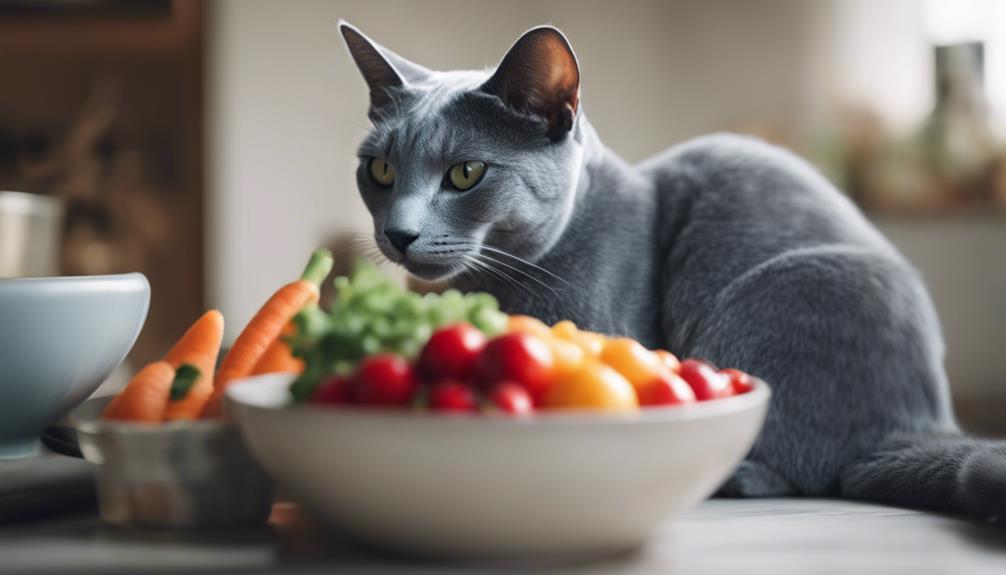
When selecting the appropriate food for your Russian Blue cat, prioritize high-quality protein content to support their muscle mass and tissue repair needs. Look for cat foods with protein levels ranging from 30-45% to ensure your Russian Blue receives the necessary nutrients for overall health.
Additionally, make sure the food contains healthy fats such as omega-3 and omega-6 to provide energy and promote a shiny coat. Essential vitamins like A, E, D, and minerals like calcium are crucial for the well-being of your Russian Blue cat.
Avoid cat foods with unnecessary carbohydrates and opt for those with adequate fiber to aid in digestion. Choose products with limited fillers and artificial additives to offer a balanced and nutritious diet for your Russian Blue, promoting their longevity and vitality.
Feeding Guidelines for Russian Blue Cats
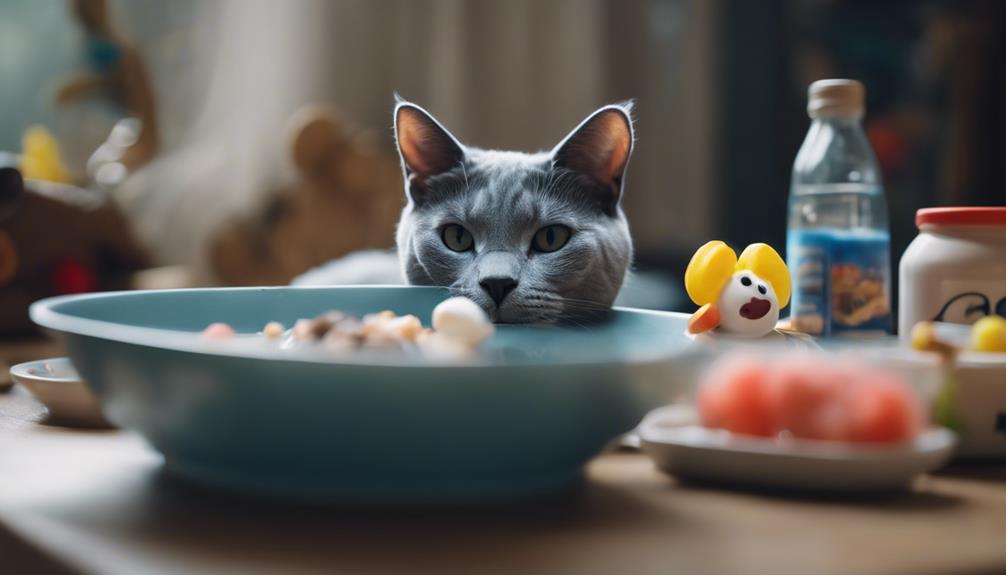
In establishing a healthy feeding routine for Russian Blue cats, focus on providing a balanced diet rich in high-quality protein, essential fats, vitamins, and minerals to support their overall well-being and vitality. When considering the food for your Russian Blue, keep in mind the following guidelines:
- High-Quality Protein: Ensure their diet consists of protein within the range of 30-45% to support muscle mass and tissue repair.
- Essential Fats: Incorporate healthy fats like omega-3 and omega-6 for energy and to maintain a healthy coat.
- Vitamins and Minerals: Provide essential nutrients such as Vitamins A, E, D, and minerals like calcium to support their overall health.
- Nutritional Balance: Aim for a well-rounded diet that meets all their nutritional needs to keep them healthy and thriving.
Common Dietary Issues
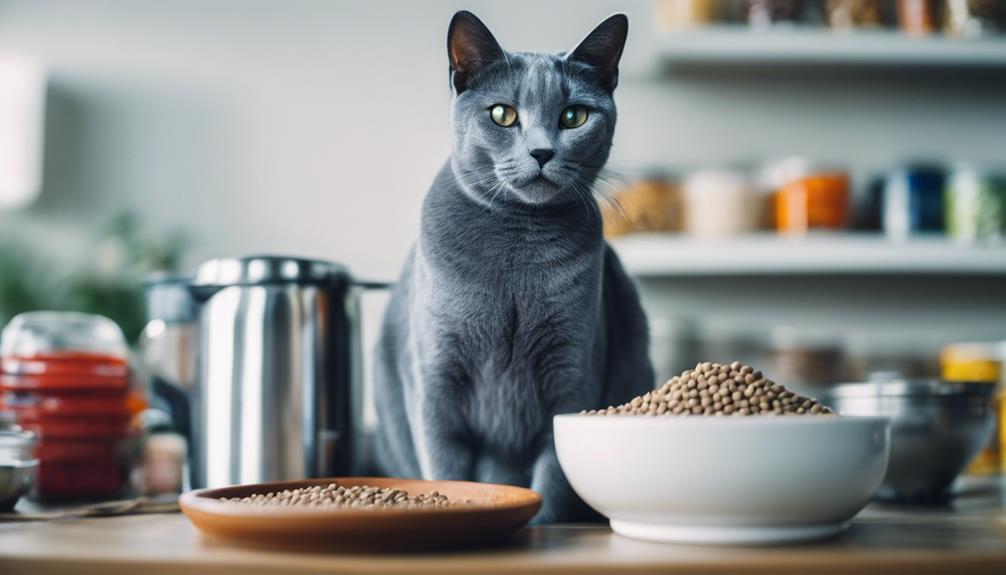
Russian Blue cats commonly face dietary issues that can impact their health and well-being. These issues include urinary tract problems resulting from insufficient water intake, obesity due to uncontrolled diet portions, digestive problems from food sensitivities, skin and coat issues caused by inadequate nutrition, and the risk of developing diabetes if a balanced diet is not maintained. Proper diet control is essential to prevent these health concerns in Russian Blue cats.
| Common Dietary Issues | Description |
|---|---|
| Urinary Tract Issues | Insufficient water intake can lead to urinary problems in Russian Blue cats. |
| Obesity | Uncontrolled diet portions may result in obesity, affecting the health of Russian Blue cats. |
| Sensitivity to Foods | Food sensitivities can cause digestive issues in Russian Blue cats. |
| Inadequate Nutrition | Lack of proper nutrition can lead to skin and coat problems in Russian Blue cats. |
| Balanced Diet | Maintaining a balanced diet is crucial to prevent diabetes and other health issues. |
Homemade Diets and Raw Food
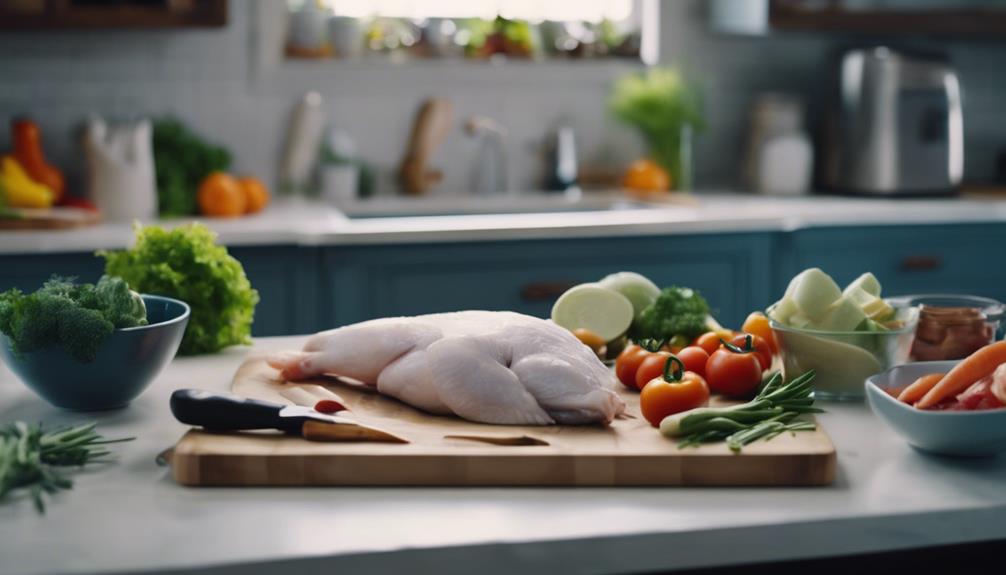
Homemade diets for Russian Blue cats can offer benefits such as customization and control over ingredients.
However, raw food diets come with risks like bacterial contamination.
Maintaining nutritional balance is crucial when considering homemade or raw diets to meet the specific dietary requirements of Russian Blue cats.
Benefits of Homemade Diets
When considering a diet for your Russian Blue cat, exploring homemade options can offer tailored nutrition and potential benefits, especially in comparison to raw food diets.
- Homemade diets for Russian Blue cats can provide balanced nutrition tailored to their individual needs.
- Properly balanced homemade diets can help prevent health issues and promote vitality in Russian Blue cats.
- Homemade diets offer the advantage of avoiding artificial additives often found in commercial cat foods.
- Consulting with a veterinarian is crucial to ensure the homemade diet meets all nutritional requirements.
Homemade diets are a great way to ensure your Russian Blue receives the specific nutrients they require while avoiding potential risks associated with raw food diets.
Risks of Raw Food
Raw food diets pose significant risks to feline health due to the potential introduction of harmful bacteria and parasites. Feeding raw or homemade diets can expose cats to foodborne illnesses such as Salmonella and E. coli found in raw meat. Additionally, homemade diets may lack essential nutrients like taurine, leading to severe health issues in Russian Blue cats.
Raw meat can also harbor parasites that aren't only harmful to cats but also pose a risk to humans. To ensure the nutritional balance and safety of your feline companion, it's crucial to consult with a veterinarian before considering a raw or homemade diet.
Veterinarian guidance is essential in providing a diet that meets your Russian Blue's specific needs and avoids potential health hazards.
Nutritional Balance Importance
Ensuring proper nutritional balance is essential when considering diets for Russian Blue cats, whether homemade or raw. When focusing on homemade diets, it's crucial to balance the essential nutrients to meet your cat's dietary requirements.
Raw food diets can pose risks due to potential bacterial contamination, so caution is advised before opting for this option. Consulting with a vet is important to tailor a balanced homemade or raw food diet specific to your Russian Blue's nutritional needs.
Proper hydration is key when feeding homemade or raw diets to Russian Blue cats to support their overall health. Choosing high-quality commercial cat food with balanced nutrition may offer a safer and more convenient alternative for ensuring your Russian Blue's optimal nutrition.
What Not to Feed Your Russian Blue
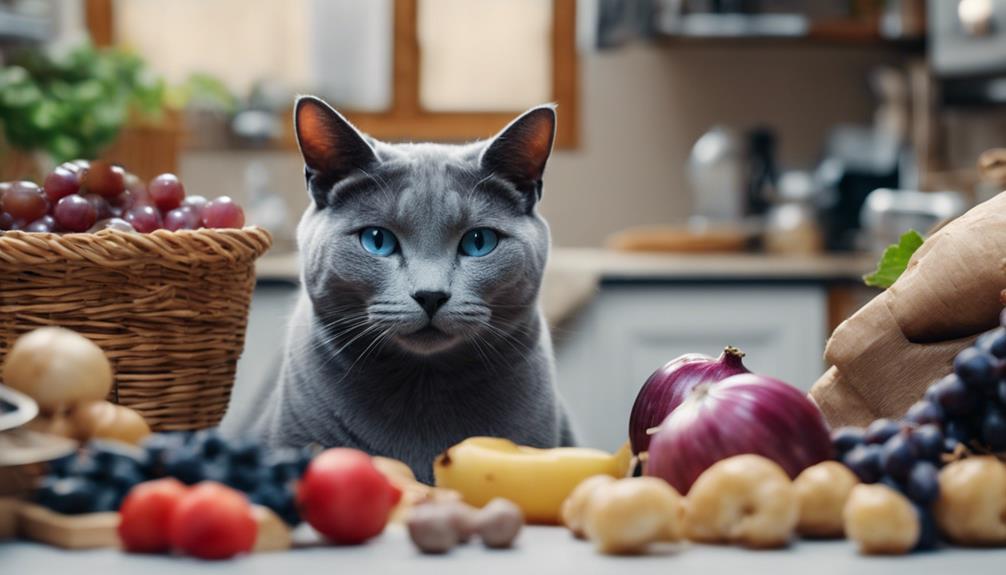
For the optimal health of your Russian Blue, it is imperative to steer clear of feeding them chocolate, caffeine, alcohol, grapes, and raisins, all of which are toxic to cats. These items can cause a range of health issues, from gastrointestinal problems to kidney failure, and should be strictly avoided in your Russian Blue's diet. Additionally, onions, garlic, chives, and raw eggs should not be included in their meals as they can also be harmful. To help you better understand what not to feed your Russian Blue, refer to the table below:
| Hazardous Foods | Potential Issues |
|---|---|
| Chocolate | Toxicity |
| Caffeine | Toxicity |
| Alcohol | Toxicity |
| Grapes/Raisins | Kidney damage |
Frequently Asked Questions
What Should I Feed My Russian Blue Cat?
A Russian Blue cat should be fed a diet rich in quality protein, healthy fats, and essential vitamins and minerals. Opt for premium cat foods for balanced nutrition. Avoid unnecessary carbs. Always consider portion control and dental health.
Why Is My Russian Blue Always Hungry?
Russian Blues may always seem hungry due to their high metabolism. Weight management through portion control, food puzzles, and interactive toys can help. Establishing a feeding schedule with high protein diets, treat alternatives, vet checkups, exercise, and mental stimulation is crucial.
How Do You Keep Russian Blue Happy?
To keep a Russian Blue happy, engage in playtime activities, provide comfortable bedding, interactive toys, mental stimulation, grooming techniques, exercise routines, environmental enrichment, healthy treats, social interactions, and routine vet checkups. These elements are crucial for their well-being.
What Are the Downsides to Russian Blue Cats?
Russian Blue cats face potential health risks like obesity, diabetes, and heart disease if not fed a proper diet. Overfeeding can lead to weight gain and picky eating habits. Owners must manage nutrition for optimal health.











